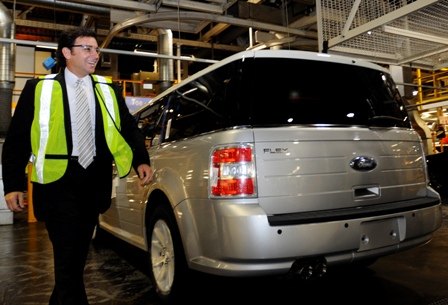Ford Reportedly Looking For $400 Million From Canadian Government As Belts Tighten Across Canada
The Globe and Mail’s Greg Keenan explored an interesting conundrum that Canadian governmental officials are facing; is it worth subsidizing auto industry manufacturing facilities, even with austerity programs in place?
Keenan cites upgrades to Ford’s Oakville plant, which builds vehicles like the Edge and Flex, as having the potential to require a total of $400 million in government money. While the sum is steep, the upgrades would preserve the 2,800 jobs currently at the plant, and allow for a global platform vehicle to be built, increasing the potential for exports beyond the U.S. market.
States like Tennessee and Alabama are courting car companies with what Keenen describes as “… incentives worth hundreds of millions of dollars at auto makers to finance training, infrastructure and real estate purchases and provide tax holidays to land the thousands of jobs created by assembly plants.” Of course, those states tend to have plants that aren’t unionized. Foreign automakers tend to build in the South more than the Big Three, but GM recently moved some production of the Chevrolet Equinox from Oshawa to Tennessee in part because they could pay new hires $14 an hour rather than the $32 an hour paid to Oshawa employees.
High CAW wages and a strong Canadian dollar give the automakers the potential for an easy way out when it comes to packing up and moving their plants elsewhere. Bringing production back to America, at $14 an hour would not only cut costs but provide good optics for American manufacturers. Moving production to Mexico, already a trend among a number of automakers, would provide further costs savings, and if the last generation Ford Fusion is anything to go by, no major drop in quality.
More by Derek Kreindler
Latest Car Reviews
Read moreLatest Product Reviews
Read moreRecent Comments
- MaintenanceCosts I've never prioritized color when looking for a car, but there are usually some colors (particularly bright reds and refrigerator whites) that I just won't accept.That said, one of my cars gets parked outside in a city environment, and it's silver, and that's good because silver does not complain too much when oxidized to he!l. The brown BMW is neat because there aren't many brown BMWs, and the green Legend is historically correct because the mid-'90s meant green.
- ToolGuy • Black vehicles and dark interiors burn more petrol and are bad for the planet (look it up, I'm not gonna hold your hand on this one lol).• If your current vehicle was new when you took delivery, and you didn't get EXACTLY the color you wanted (blithely accepted what was foisted on you by the dealer), shame on you. You are the problem with today's franchise system. In future, please notify the dealer that your policy is to collect a Non-First-Choice Paint Upcharge in such a circumstance. I recommend $1200.• Also, fine-thread drywall screws (in wood) waste electricity (and time). When I am President of the Universe, fine-thread drywall screws will be banned in favor of the more environmentally- and wallet-friendly coarse-thread variety. (Again, you can work out the reasons but I am absolutely correct.)
- Blope Cataluna Red Audi Etron and a Red Golf TDI Wagon
- Vulpine Considering the size of modern full-sized pickup, they NEED the ability to "squat" just to be able to load/unload them from the rear. It's a law that needs to be contested for the utility of the capability, despite the fact that... yes, it can be abused by show--offs.
- SCE to AUX I have two bright blue Hyundais at the moment, and I've only had one red car.I think I've had 7 white cars. My very first car was orange.A friend once said he buys the ugliest, or most garish color on the lot, to try and get a better price on a dealer dud. It also makes the car easier to spot in a sea of gray vehicles. I couldn't do that, but I see the logic.


































Comments
Join the conversation
So much for Ford trumpeting the 'we didn't take bailout' line. They are tramps just like the tools at RenCen.
There are real costs to running a business in the Great White North that go far beyond arguments about socialism or corporate welfare. For starters, we have the population of California in a land mass larger than the entire United States. Transportation costs are higher here. Look at the cost of twinning highway 69 north from Toronto: the blasting of rock and filling in of bogs, as compared to an interstate through Pennsylvania or Arizona. Secondly, although southern Ontario may be farther south than the Dakotas or Washington state, we have abysmal weather: 90 degree summer days and 10 degree winters. Cities like Toronto and Montreal can shell out $100M in a bad winter just to move snow around. Atlanta and Nashville don't face those challenges. Then there's the lifespan of bridges, roads, etc. I'd wager a sidewalk in Houston lasts forever. In Toronto, the freeze-thaw cycle destroys them in 40 years or so. Or the cost of heating/cooling a factory or warehouse in Toronto or Montreal, as compared to St. Louis or Raleigh. I am no fan of unions, but I am not a big fan of free trade or globalization, either. With perhaps the exception of fresh tomatoes in January, Canada is self-sufficient in everything it produces and if not for the petty east-west bickering, we could have closed our borders decades ago and gone our own way. We have done well by trading with our Southern neighbors, but Japan Inc threw a monkey wrench into that relationship, and Korea Inc is about to finish it off. Our trade surplus with the U.S. is overshadowed by our trade losses everywhere else. Amongst other financial challenges, Canada carries a huge current account deficit, in no small part thanks to swelling trade deficits in Asia for autos and auto parts. Everyone is quick to slay other people's jobs at the altar of choice, but other than 40 types of patio lanterns to choose from at Wal-Mart at prices my father would have paid 40 years ago, I see no advantages to offshoring everyone else's jobs. Sooner or later, everyone will be working for Chinese wages.